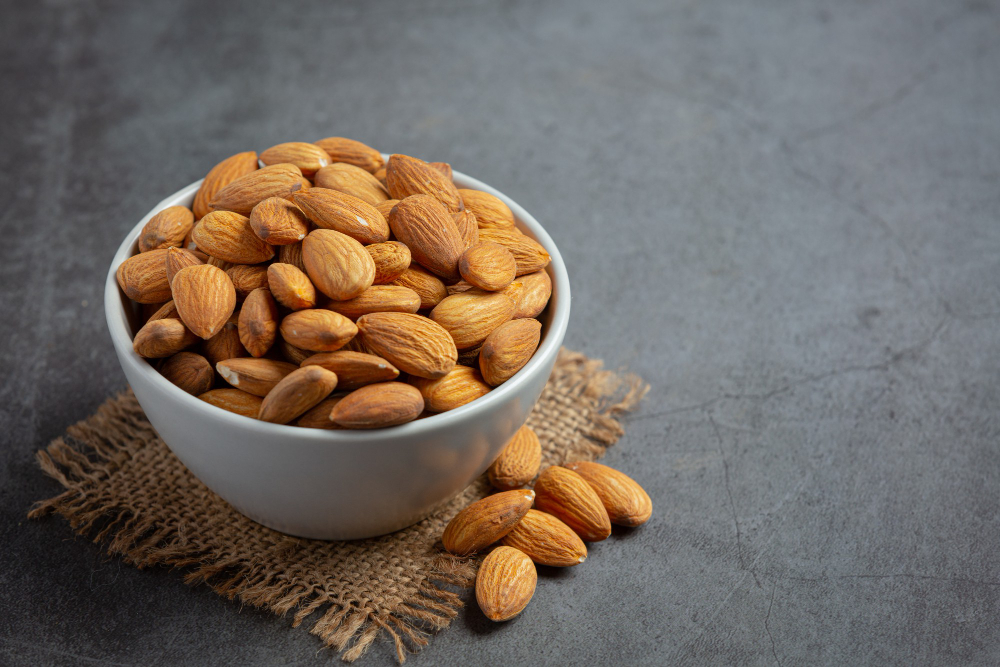Introduction
What comes to mind when you hear the word “badam”? For many, it’s the rich, nutty flavor of almonds, enjoyed in a variety of forms. But there’s so much more to badam than just a tasty snack. This comprehensive guide delves into the nutritional benefits, health advantages, culinary uses, and cultural significance of almonds, also known as badam.
What is Badam?
Badam, the Hindi word for almonds, refers to the seeds of the Prunus dulcis tree. These seeds are not only delicious but also packed with nutrients that make them a staple in many diets around the world.
Brief History of Almonds
Almonds have been cultivated for thousands of years, with origins tracing back to the Middle East. They were mentioned in ancient texts and were highly valued for their nutritional properties and versatility in cooking.
Nutritional Benefits of Badam
Almonds are a powerhouse of nutrients. Here’s a closer look at what makes them so beneficial:
Vitamins and Minerals
Badam is rich in essential vitamins and minerals, including Vitamin E, magnesium, and potassium. These nutrients are crucial for maintaining various bodily functions, from skin health to muscle function.
Protein Content
A handful of almonds provides a significant amount of protein, making them an excellent snack for vegetarians and those looking to increase their protein intake without consuming animal products.
Healthy Fats
Almonds are high in monounsaturated fats, which are known for their heart-healthy benefits. These fats can help lower bad cholesterol levels and reduce the risk of heart disease.
Health Benefits of Badam
The health benefits of badam extend far beyond their nutritional content. Here are some key advantages of including almonds in your diet:
Heart Health
Regular consumption of almonds can support heart health by lowering LDL cholesterol levels and improving blood lipid profiles. The presence of antioxidants like Vitamin E also helps in reducing oxidative stress and inflammation.
Weight Management
Despite being high in calories, almonds can be a valuable part of a weight management plan. Their high fiber and protein content can help you feel fuller for longer, reducing overall calorie intake.
Skin and Hair Health
The Vitamin E and antioxidants in badam are excellent for maintaining healthy skin and hair. They can help combat oxidative stress, leading to a more youthful appearance and stronger hair.
Bone Health
Almonds are a good source of calcium, magnesium, and phosphorus, all of which are essential for maintaining strong bones and preventing conditions like osteoporosis.
Digestive Health
The fiber content in almonds aids in digestion and helps maintain a healthy gut. It can also help prevent constipation and promote regular bowel movements.
Badam in Different Cuisines
Almonds are a versatile ingredient used in various cuisines around the world:
Indian Cuisine
In India, almonds are used in both savory and sweet dishes. Badam halwa, a rich dessert, and almond-based curries are popular examples.
Middle Eastern Cuisine
Almonds are a staple in Middle Eastern cooking, often used in sweets like baklava and savory dishes like pilafs.
Western Cuisine
In Western countries, almonds are used in a variety of ways, from almond milk and butter to being a key ingredient in baked goods.
How to Incorporate Badam into Your Diet
There are numerous ways to enjoy almonds:
Raw and Roasted Badam
Raw and roasted almonds make for a great snack. They can be eaten on their own or added to salads, yogurts, and other dishes for extra crunch and flavor.
Badam Milk
Almond milk is a popular dairy alternative, ideal for those who are lactose intolerant or looking to reduce dairy consumption.
Butter
Almond butter is a nutritious spread that can be used on toast, in smoothies, or as a dip for fruits and vegetables.
Flour
Almond flour is a gluten-free alternative to wheat flour, perfect for baking cakes, cookies, and bread.
Badam Recipes
Here are a few delicious recipes to try:
Almond Smoothie
Blend almonds with fruits, yogurt, and a bit of honey for a nutritious and filling smoothie.
Badam Halwa
A traditional Indian dessert made with ground almonds, sugar, and ghee. It’s rich, creamy, and perfect for special occasions.
Almond-Crusted Chicken
Coat chicken breasts in crushed almonds before baking for a crunchy, flavorful meal.
Cookies
Delicious and healthy cookies made with almond butter, perfect for a guilt-free treat.
Buying and Storing Badam
To get the most out of your almonds, it’s important to choose and store them properly:
How to Choose Quality Badam
Look for almonds that are uniform in size and color. Avoid any that are shriveled or have an off smell.
Storing Badam for Freshness
Store almonds in an airtight container in a cool, dark place. For longer storage, keep them in the refrigerator or freezer.
Badam and Allergies
While almonds are nutritious, they can cause allergic reactions in some people:
Symptoms of Almond Allergy
Symptoms can range from mild (itching, hives) to severe (anaphylaxis). It’s important to be aware of these and seek medical help if needed.
Managing Almond Allergy
If you have an almond allergy, avoid all almond products and be cautious of cross-contamination in foods.
Cultural Significance of Badam
Almonds hold a special place in various cultures:
Festivals and Traditions
In many cultures, almonds are used in traditional dishes during festivals and celebrations. They symbolize good health and prosperity.
Symbolism in Different Cultures
Almonds have been considered symbols of fertility, good luck, and wealth in different cultures throughout history.
Conclusion
Incorporating badam into your diet can offer numerous health benefits, from improving heart health to enhancing skin and hair. Whether enjoyed raw, as almond milk, or in delicious recipes, almonds are a versatile and nutritious addition to any diet.
FAQs
What is the best way to consume badam?
The best way to consume badam is to eat them raw or roasted, include them in smoothies, or use almond milk and butter in your diet.
Can badam help with weight loss?
Yes, almonds can help with weight loss due to their high protein and fiber content, which helps you feel full longer.
Are there any side effects of eating too many badams?
Eating too many almonds can lead to weight gain and digestive issues due to their high calorie and fiber content. Moderation is key.
How can I tell if I have an almond allergy?
Symptoms of an almond allergy include itching, hives, swelling, and in severe cases, anaphylaxis. If you suspect an allergy, seek medical advice.
Is almond milk a good substitute for dairy milk?
Yes, almond milk is a great dairy substitute for those who are lactose intolerant or looking to reduce dairy consumption. It is low in calories and rich in nutrients.




